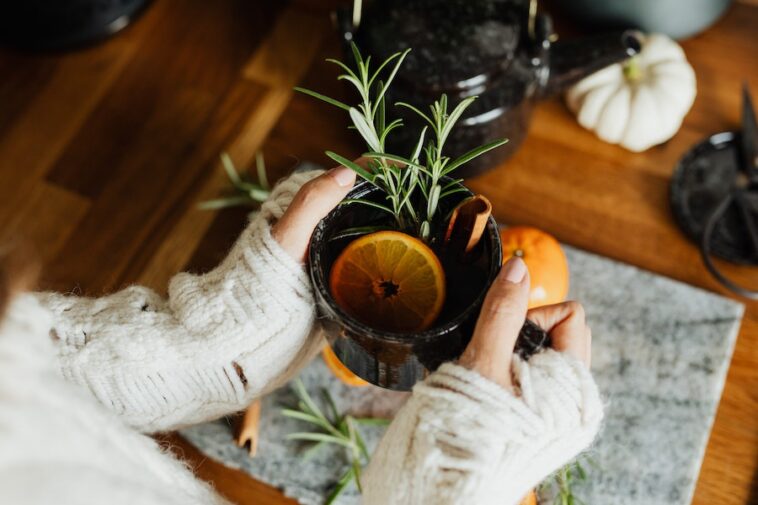Suffering from a sore throat can be a real pain, literally. Whether it’s due to a seasonal cold, allergies, or simply overexertion, that scratchy, irritated feeling in your throat can disrupt your daily life. One remedy that’s been gaining popularity is lemon ginger tea. But does it really work? In this article, we’ll delve into the world of lemon ginger tea to uncover its potential as a soothing elixir for sore throats. From its rich history to the science behind its healing properties, we’ll explore whether this natural remedy lives up to the hype.
Is Lemon Ginger Tea Good For Sore Throat?
Yes, lemon ginger tea is often considered beneficial for a sore throat. The combination of lemon’s vitamin C and ginger’s anti-inflammatory properties can help soothe discomfort and reduce inflammation. Additionally, the warm liquid can provide temporary relief. While it may not cure the underlying cause, lemon ginger tea is a popular and natural remedy to alleviate sore throat symptoms.

The Healing Properties Of Lemon Ginger Tea
The healing properties of lemon ginger tea are rooted in the remarkable qualities of its two main ingredients, lemon and ginger.
- Anti-Inflammatory Benefits: Ginger is renowned for its potent anti-inflammatory properties. It contains compounds like gingerol that can help reduce inflammation in the body, including in the throat. Inflammation often accompanies sore throats, making ginger a valuable component in alleviating discomfort.
- Immune System Support: Lemons, on the other hand, are rich in vitamin C, which is well-known for its immune-boosting properties. When you have a sore throat, your immune system is working hard to combat the infection. Lemon’s vitamin C content can help bolster your body’s defenses.
- Soothing and Hydrating: Both lemon and ginger offer soothing effects. The warm, steamy nature of the tea can help relax the throat and alleviate pain. Furthermore, the hydration provided by the tea is essential for maintaining a moist throat lining and reducing irritation.
- Digestive Aid: Ginger is also known for aiding digestion. If your sore throat is due to acid reflux or digestive issues, ginger can help calm the stomach and indirectly provide relief for your throat.
How To Make Lemon Ginger Tea Good For Sore Throat?
Making lemon ginger tea for a sore throat is simple and can be done in a few easy steps. Here’s a basic recipe to get you started:
Ingredients:
- 1-inch piece of fresh ginger, thinly sliced or grated
- 1 lemon, sliced or juiced
- 2 cups of water
- Honey (optional, for sweetness and added throat-soothing benefits)
Instructions:
- Prepare the Ingredients: Wash the ginger and lemon thoroughly. If using slices, thinly slice the ginger. If using grated ginger, peel and finely grate it. Slice the lemon, or squeeze its juice.
- Boil the Water: In a small pot, bring the 2 cups of water to a boil.
- Add Ginger: Once the water is boiling, add the sliced or grated ginger to the pot. Reduce the heat to low, cover, and let it simmer for about 10-15 minutes. This allows the ginger’s beneficial compounds to infuse into the water.
- Add Lemon: After simmering, add the lemon slices or juice to the ginger-infused water. Lemon adds a refreshing flavor and provides vitamin C to help boost your immune system.
- Sweeten with Honey (Optional): If desired, add honey to the tea for sweetness and additional soothing benefits. Honey can help coat the throat and alleviate irritation.
- Steep and Strain: Cover the pot and let the lemon ginger tea steep for another 5-10 minutes. This allows the flavors to meld. Then, strain the tea into a cup or mug to remove the ginger slices.
- Enjoy: Sip the lemon ginger tea while it’s still warm. The warm liquid will help soothe your sore throat, and the combined properties of ginger, lemon, and honey can provide relief and comfort.
How Lemon And Ginger Work Together To Provide Relief?
Lemon and ginger work synergistically to provide relief for a sore throat through their combined properties and actions:
- Anti-Inflammatory Effects: Both lemon and ginger contain compounds with anti-inflammatory properties. Gingerol in ginger and various antioxidants in lemon can help reduce inflammation in the throat, which is often a source of pain and discomfort during a sore throat.
- Immune System Support: Lemon is rich in vitamin C, a powerful antioxidant that supports the immune system. When you have a sore throat, your body is fighting off an infection, and vitamin C can aid in this process by boosting immune function.
- Soothing and Hydrating: The warm liquid of the tea itself is soothing to the throat. It helps relax the muscles and tissues, reducing the sensation of dryness and irritation. Proper hydration is essential during illness to keep the throat moist and comfortable.
- Antibacterial and Antiviral Properties: Ginger has natural antibacterial and antiviral properties, which can help combat the underlying cause of the sore throat, particularly if it’s due to a bacterial or viral infection.
- Digestive Aid: Ginger is known for its ability to ease digestive discomfort. If your sore throat is related to acid reflux or indigestion, ginger can help calm the stomach and indirectly provide relief for your throat.
- Honey Synergy (Optional): If you add honey to your lemon ginger tea, it further enhances the soothing and healing effects. Honey can coat the throat, reducing irritation, and it also has antibacterial properties. Additionally, honey can improve the overall taste, making the tea more enjoyable.
Precautions And Side Effects
While lemon ginger tea is generally considered safe and offers several health benefits, there are some precautions and potential side effects to be aware of:
- Allergies: Individuals with allergies to citrus fruits (including lemons) or ginger should exercise caution when consuming lemon ginger tea. Allergic reactions may include skin rashes, itching, or even more severe symptoms like difficulty breathing. If you suspect an allergy, discontinue use and seek medical attention if necessary.
- Gastrointestinal Issues: Ginger, in some cases, can cause gastrointestinal discomfort, such as heartburn, stomach upset, or diarrhea, especially when consumed in large quantities. If you experience any of these symptoms, consider reducing your ginger intake or discontinuing use.
- Blood-Thinning Effects: Ginger has natural blood-thinning properties. While this can be beneficial for some individuals, it may interact with certain medications or medical conditions. If you’re taking blood-thinning medications or have a bleeding disorder, consult your healthcare provider before regularly consuming large amounts of ginger.
- Heartburn or Acid Reflux: Ginger can relax the lower esophageal sphincter, potentially worsening symptoms of heartburn or acid reflux in some individuals. If you have acid reflux or gastroesophageal reflux disease (GERD), it’s advisable to moderate your ginger intake or consult a healthcare professional.
- Interaction with Medications: Ginger can interact with certain medications, including blood pressure medications, anticoagulants, and diabetes medications. If you’re taking any prescription medications, especially those mentioned, consult your healthcare provider before adding ginger to your daily routine.
- Overconsumption: Like any natural remedy, moderation is key. Drinking excessive amounts of lemon ginger tea may lead to an upset stomach, as ginger can be quite potent. Stick to recommended serving sizes and consult a healthcare provider if you plan to consume large quantities regularly.
- Dental Health: Lemon is acidic and can potentially erode tooth enamel if consumed frequently. To mitigate this, consider using a straw to drink lemon ginger tea and rinse your mouth with water after consumption.
- Pregnancy and Lactation: Pregnant and breastfeeding individuals should exercise caution when using ginger in therapeutic doses. While small amounts of ginger in cooking are generally considered safe, it’s advisable to consult a healthcare provider before using ginger as a remedy during pregnancy or while breastfeeding.
Lifestyle Tips For Sore Throat Prevention
Preventing a sore throat is often more manageable than treating one. Here are some lifestyle tips and practices to help you avoid sore throats:
- Frequent Handwashing: Proper hand hygiene is one of the most effective ways to prevent infections that can lead to sore throats. Wash your hands regularly with soap and water for at least 20 seconds, especially before eating or touching your face.
- Avoid Close Contact with Sick Individuals: If someone you know is sick with a contagious illness like the common cold or flu, try to minimize close contact to reduce the risk of transmission.
- Practice Respiratory Hygiene: Cover your mouth and nose with a tissue or your elbow when coughing or sneezing to prevent the spread of respiratory infections.
- Stay Hydrated: Proper hydration keeps your throat moist and can help prevent irritation. Aim to drink plenty of water throughout the day.
- Humidify the Air: Dry indoor air can irritate the throat. Use a humidifier in your bedroom, especially during the winter months when indoor heating can dry out the air.
- Maintain a Healthy Diet: A balanced diet rich in fruits, vegetables, and whole grains provides essential nutrients that support your immune system. Vitamins and minerals like vitamin C and zinc can help prevent infections.
- Regular Exercise: Moderate, regular exercise can boost your immune system and overall health, reducing your vulnerability to infections.
- Adequate Sleep: Getting enough restorative sleep is essential for a strong immune system. Aim for 7-9 hours of quality sleep per night.
- Reduce Stress: Chronic stress can weaken the immune system. Practice stress-reduction techniques like deep breathing, meditation, or yoga to help manage stress levels.
Conclusion
In conclusion, a sore throat can be an uncomfortable inconvenience, but with the right knowledge and practices, you can both prevent and alleviate it. Lemon ginger tea, with its natural soothing and anti-inflammatory properties, stands as a comforting remedy. However, a holistic approach, including maintaining a healthy lifestyle and practicing good hygiene, remains essential in safeguarding your throat’s well-being. So, whether you’re seeking relief or aiming to prevent discomfort, a combination of mindful choices can lead to a happier, healthier throat.
FAQs
Is Lemon Ginger Tea Safe For Children With Sore Throats?
Yes, in moderation. It can be a soothing option for children over one-year-old. Adjust ginger content for their tolerance.
Can I Use Bottled Lemon Juice For The Tea?
Fresh lemon juice is preferable, but bottled juice can work in a pinch. Avoid added sugars or preservatives.
How Often Should I Drink Lemon Ginger Tea For A Sore Throat?
2-3 cups a day can help. Adjust based on personal preference and symptom severity.
Is It Okay To Add Other Ingredients Like Mint Or Honey?
Yes, both can enhance flavor and provide additional throat-soothing benefits.
Can I Prepare Lemon Ginger Tea In Advance And Store It?
It’s best fresh, but you can refrigerate it for up to 24 hours. Reheat gently, as needed.





